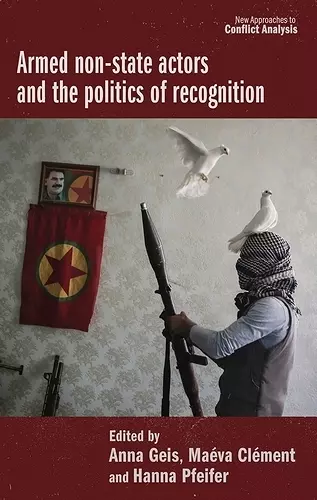Armed Non-State Actors and the Politics of Recognition
Anna Geis editor Maéva Clément editor Hanna Pfeifer editor
Format:Hardback
Publisher:Manchester University Press
Published:15th Jun '21
Should be back in stock very soon

Recognition is often considered a means to de-escalate conflicts and promote peaceful social interactions. This volume explores the forms that social recognition and its withholding may take in asymmetric armed conflicts, examining the risks and opportunities that arise when local, state, and transnational actors recognise, misrecognise, or deny recognition of armed non-state actors.
By studying key asymmetric conflicts through the prism of recognition, it offers an innovative perspective on the interactions between armed non-state actors and state actors. In what contexts does granting recognition to armed non-state actors foster conflict transformation? What happens when governments withhold recognition or label armed non-state actors in ways they perceive as misrecognition? The authors examine the ambivalence of recognition processes in violent conflicts and their sometimes-unintended consequences. The volume shows that, while non-recognition prevents conflict transformation, the recognition of armed non-state actors may produce counterproductive precedents and new modes of exclusion in intra-state and transnational politics.
'This is a critically important book on the significance of recognition for non-state armed actors. The volume is based on a rich corpus of case studies problematizing recognition at various stages of conflict escalation. By investigating normative aspects as well as practices, it is a must-read for anyone interested in asymmetrical conflicts in the twenty-second century.'
Lisa Strömbom, Associate Professor of Political Science, Lund University
'We often think of insurgents or rebel armies as operating in places where there is no room for mutual recognition and other normative practices. But this is wrong. This book shines a spotlight on the complex role of recognition practices and their often positive consequences in some of the most intractable conflicts in the world.'
Volker M. Heins, Institute for Advanced Study in the Humanities, University of Duisburg-Essen, Germany
'This thought-provoking book explores the possibilities and pitfalls of recognizing armed non-state actors during conflicts, stalemates, and peace processes. Through insightful theoretical chapters and a wealth of case studies from around the world, it helpfully illuminates the complexities of seeking and granting recognition.'
Elizabeth King, Associate Professor of International Education, New York University
ISBN: 9781526152756
Dimensions: 234mm x 156mm x 17mm
Weight: 594g
288 pages